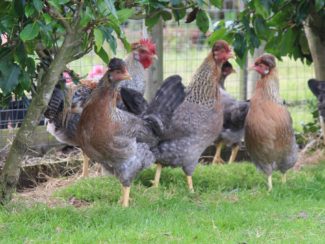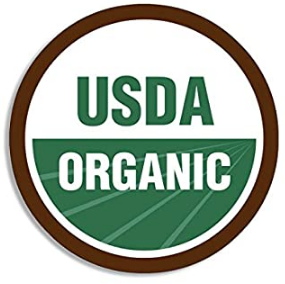Backyard Chickens in Massachusetts

“Crested Cream Legbar” Chickens
Raising your own chickens in urban or suburban neighborhoods is becoming more and more popular (Update: especially now, during the 2020 pandemic!). Keeping backyard poultry offers a fresh, nutritious, and sustainable source of eggs or meat. It can also be a LOT of fun.
The additional benefits of poultry-raising are also attractive:
- A small flock of poultry can reduce the amount of organic food waste that ends up in the landfill. Chickens will happily gobble up your leftovers and spoiled foods.
- Children love interacting with chickens! It’s a great way to teach them about life cycles, animal behavior, and give them a chance to be involved in producing their own food.
- Poultry create a wonderful source of balanced organic fertility for your edible and ornamental gardens. You can either let your chickens roam (with prudence) in your garden or you can integrate their manure or bedding into your compost.
- What better way to make friends with your neighbors than by offering them some of your fresh eggs or meat?
Why raise your chickens organically?
There are many benefits to raising your flock organically. First and foremost, raising organic chickens decreases the amount of synthetic pesticides and chemicals that you might be exposed to and that others may use when growing the feed that you buy (see sources for organic feed, below). Not only is this good for the human health of everyone involved, but also for the chickens and for the environment.
By buying organically grown feed you are supporting agricultural practices which are centered around maintaining healthy soils and healthy waters. Chemical pesticides/herbicides used to control pests/weeds have a tendency to not only contaminate agricultural products, but also leach into the soil and enter bodies of water. Organic agricultural practices which build soil carbon increase water retention in the soil, increase nutrient cycling, and directly combat climate change by pulling carbon out of the atmosphere and storing it in the soil.
Choosing to raise your flock organically promotes a safe environment for your family and your chickens, and comes with commercial benefits as well. People are increasingly drawn to organic products for the above-mentioned reasons.
Can you call your eggs “organic” without getting certified?

- If a chicken farming operation generates less than $5,000 worth of gross revenue from egg sales, then this farm can adopt the title of “organic exempt.” What this means is that while the farm is organic in every sense of the term, it lacks the legal certification.
- Organic exempt farms must vow to only raise their chickens on organic feed from their second day of life on, and their chickens must be fed exclusively organic treats and supplements.
- Chickens must only be exposed to organic compliant bedding and organically managed land.
- If a chicken receives medical treatment and is administered medicine, or if it comes into contact with pesticides/chemicals, it must be removed from the flock and is no longer be considered “organic.”
- Eggs collected must be washed and cleaned using certified organic cleaners only.
- If you choose to raise your chickens organically and you keep records/invoices that support this commitment, then you can legally and ethically claim that your eggs are grown organically.
What does it mean to be certified organic?
 Organic certification involves a lengthy (though rewarding) process that involves attention to detail and commitment and results in a certification from the USDA. It means that a farm has vowed to only engage in organic farming practices in order to control pests, weeds and raise livestock. Keeping up with a certification means a regular 3rd party inspection (which comes with a fee) and requires that the farmers are keeping detailed records of all inputs being used.
Organic certification involves a lengthy (though rewarding) process that involves attention to detail and commitment and results in a certification from the USDA. It means that a farm has vowed to only engage in organic farming practices in order to control pests, weeds and raise livestock. Keeping up with a certification means a regular 3rd party inspection (which comes with a fee) and requires that the farmers are keeping detailed records of all inputs being used.
Some reasons as to why smaller scale chicken farmers might seek organic certification is to help with egg sales and because their land will be exempt from aerial/perimeter insecticide spraying undertaken by public health authorities for disease control (ie. mosquito control).
For more information on organic certification, contact Bay State Organic Certifiers.
Local Chicken Regulations
Do you know if your town or city allows poultry-keeping?
Take a look at our database of local chicken regulations (Last updated May 2020)
PLEASE NOTE: The information contained in the above resource document is updated to the best of our knowledge, but may not be accurate. It’s important to verify your local zoning by-laws with city/town officials before you buy chickens or otherwise invest in raising backyard chickens!
In addition to the above database, we will list additional materials re: chicken regulations, provided by municipal offices, below: (Will be updated soon)
- Chicopee – “Fowl and Rabbit Keeping Cheatsheet” (accessed May 2020)
- Lawrence – Procedures/application for hen permit (accessed June 2020)
- New Bedford – guide to applying for a permit to build a chicken coop (accessed May 2020)
- Palmer regulations and application (accessed May 2020)
- Plymouth regulations (accessed May 2020)
On Cape Cod? Check out this page, The Cape Coop for info on chicken keeping by-laws on the Cape.
Are you unsatisfied with your town’s current regulations? Many citizen activists have been successful in changing their town’s regulations. By doing some organizing, you can progress your town toward a more food secure and sovereign future. Here are few resources to get you started:
- An article written by a lawyer about how best to comply with town rules, or to change them
- An answer to common myths about why raising chickens is a bad idea
- Talking points for keeping poultry – a one-page flyer for educating your community
- Changing the zoning laws; making your town safe for backyard hens
Organic Chicken Feed
Here are some sources for organic chicken feed. Listing does not imply endorsement. If you know fo a product that we should add to our list, please email us.
Organic Chicken Feed: What to Know Before Buying (TheHappyChickenCoop.com)
Making your own organic chicken feed (HowStuffWorks.com)
“Green Mountain Feeds (VT) is a locally owned family business. We have been manufacturing certified organic feeds since 1997, using only the highest quality organic ingredients available. Our entire product line is free from pesticides, herbicides, fungicides, hormones, antibiotics, preservatives, GMO’s, animal by-products and animal protein products.”
See Green Mountain Feeds poulty offerings, here.
Find your local dealer of Green Mountain Feeds, here.
“Nature’s Best Organic Feeds (PA) offer organic, non-medicated, Non-GMO Project-Verified poultry and livestock products in both bagged and bulk quantities. The premium line of feed prides itself on superior quality, made by a family-owned and operated company with over 70 years in business.”
See Nature’s Best Organic Feeds poultry offerings, here.
Find your local dealer of Nature’s Best Organic Feeds, here.
New Country Organics (VA and TX) offers organic soy-free feeds. “We believe certified organic grains are healthier, safer and more nutritious for your animals and for the products you and your customers consume from them. New Country Organics is soy-free. Multi-grain formulations provide a complete amino acid complement.”
See New Country Organics’ poultry offerings, here.
Find your local dealer of New Country Organics, here.
Be Social!
Check out the “MA Backyard Chicken Owners” Facebook group for lots of great tips, tricks and advice. (Also a great way to improve morale when scrolling through your Facebook feed!)
Other resources
Hatching Chicks At Home (NOFA/Mass Newsletter, April 2021)
Setting Up Your Brooder and Caring for Juvenile Poultry (NOFA/Mass Newsletter, May 2021)
The Holistic Trinity | Apple Cider Vinegar, Garlic + Diatomaceous Earth (Fresh Eggs Daily blog)
Backyard chickens.com
Includes forums and articles about raising chickens, incubating and hatching eggs, chicken diseases and injuries, and more.
Chicken ownership and adoption, MSPCA Angell
Provides a list of feeding, housing, and handling necessities to consider before you adopt backyard chickens.
Poultry program, Massachusetts Department of Agricultural Resources
Includes valuable information for backyard poultry facilities, including management practices, health issues, and more.
Raising backyard poultry without ruffling too many feathers: how to comply with local regulations and bylaws and keep your neighbors happy, Kristen M. Ploetz, Esq.
Summarizes a variety of bylaws and regulations about backyard chickens with suggestions on how to handle complaints from neighbors.
The Cape Coop – An information-rich blog kept by a backyard gardener on the Cape, including an explanation of chicken regulations for towns on Cape Cod.
Fun historical fact: back in the early part of the last century (1917 – 1918) the following was published in multiple poultry magazines:




